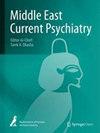Impact of depression and the potential effect of its treatment on semen parameters
IF 1.6
Q3 PSYCHIATRY
引用次数: 0
Abstract
Up to 30% of male infertility may be idiopathic. Researchers are looking into psychological problems, particularly depression, as possible risk factors for such idiopathic etiology. We aimed to assess how depression affects Egyptian patients’ semen parameters and its indicators for male fertility and to evaluate the potential positive influence of improving the score of depression on these parameters. A prospective observational pilot clinical study included twenty-one male patients with moderate, severe, or very severe depression. They were subjected to baseline semen analysis. All patients were treated by serotonin and norepinephrine reuptake inhibitors (SNRIs). Those who showed improvement in their depression, within the following 6 months, were eligible for a second evaluation of their semen. We compared baseline semen parameters of all patients to 2021-WHO lower normal limit as well as post-improvement values. Only 16 patients showed improvement in their depression after treatment with SNRIs and were candidates for the 2nd assessment of semen analysis. No significant improvements could be detected except for volume. Yet, on repeating the comparisons including only patients with abnormal baseline semen parameters, significant improvements were observed in most semen parameters, including semen volume, sperm count per ejaculate, and percentage of sperm motility either progressive or total. The results addressed the potential impact of depression on male fertility in a sample of Egyptian patients through a negative effect on semen parameters. This effect is neither sole nor direct and may require either predisposed individuals or the existence of other co-factors to be manifested. However, the appropriate treatment of depression may reverse such effects and help in the management of male infertility.抑郁症及其治疗对精液参数的潜在影响
多达 30% 的男性不育症可能是特发性的。研究人员正在研究心理问题,尤其是抑郁症,作为此类特发性病因的可能风险因素。我们旨在评估抑郁症如何影响埃及患者的精液参数及其男性生育能力指标,并评估改善抑郁症评分对这些参数的潜在积极影响。一项前瞻性观察试点临床研究纳入了 21 名患有中度、重度或极重度抑郁症的男性患者。他们都接受了精液基线分析。所有患者都接受了血清素和去甲肾上腺素再摄取抑制剂(SNRIs)治疗。在随后的 6 个月内抑郁症有所好转的患者有资格接受第二次精液评估。我们将所有患者的基线精液参数与2021-WHO正常值下限以及改善后的数值进行了比较。只有 16 名患者在接受 SNRIs 治疗后抑郁情况有所改善,因此有资格接受第二次精液分析评估。除精液量外,未发现其他明显改善。然而,在仅对精液参数基线异常的患者进行重复比较时,发现大多数精液参数都有明显改善,包括精液量、每次射精的精子数量以及精子活力的百分比(无论是渐进性还是总体性)。研究结果表明,在埃及患者样本中,抑郁症会对精液参数产生负面影响,从而对男性生育能力造成潜在影响。这种影响既不是唯一的,也不是直接的,可能需要易感个体或存在其他共同因素才能体现出来。不过,对抑郁症进行适当治疗可能会扭转这种影响,并有助于男性不育症的治疗。
本文章由计算机程序翻译,如有差异,请以英文原文为准。
求助全文
约1分钟内获得全文
求助全文
来源期刊

Middle East Current Psychiatry
Medicine-Psychiatry and Mental Health
CiteScore
3.00
自引率
0.00%
发文量
89
审稿时长
9 weeks
 求助内容:
求助内容: 应助结果提醒方式:
应助结果提醒方式:


